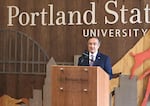The Trump administration’s travel ban as modified by the U.S. Supreme Court would not jeopardize student visas. But that hasn’t stopped university officials in Oregon from voicing concerns.
"I am disappointed by the Supreme Court's decision today to allow a limited form of President Trump's travel ban to be implemented until the court hears the case and makes a final ruling," wrote Portland State University President Wim Wiewel in a statement earlier this week.
PSU's vice provost for international affairs Margaret Everett confirmed that current and incoming students should remain unaffected. They should be able to travel and pursue their education as planned.
Related: Travel Ban Ruling Leaves Myriad Questions Unanswered
But with the Supreme Court hearing the case again in the fall, officials are concerned about what could happen next, as well as the effect on future students. Everett and Wiewel have also voiced concern about the tone coming out of Washington, D.C.
“The travel bans, as well as sort of the rhetoric of the current administration regardless of the fate of those bans, could have a chilling effect on international student recruitment in general, but also, obviously, specifically from these countries,” Everett said.
Everett is concerned that between the national rhetoric, the legal uncertainty and the relatively slow process of obtaining visas, that students overseas may give up on study at PSU or other American universities.
"Of course, pursuing visas from those countries can be a challenging, long, expensive process, so I would expect that students would be potentially discouraged, if it's not clear what the outcome of that process might be," Everett said.
Everett is further concerned that students may hesitate in filing the necessary paperwork to get their visas and jeopardize their receiving it in time to get to college for the start of the term.
"Will they be able to get visas in time?" Everett said. "It does seem the process for securing those visas is slower than it has been in the past, so we're certainly advising our incoming students to seek those visas as soon as they can."
Everett said last school year, PSU had about 60 students from countries affected by the travel ban.

Portland State University has hired New York Institute of Technology interim president Rahmat Shoureshi to be its next leader.
Rob Manning / OPB
The largest single group of students from the six affected countries is likely to be a cohort of Iranian engineering students, Everett said. That would continue strong historic ties between Portland State and Iran.
PSU named the engineering building it opened in 2006, after Iranian PSU graduate Fariborz Maseeh. PSU's incoming president, Rahmat Shoureshi, was born in Iran and is an engineer by training.
When Shoureshi was named PSU president, he made a point of affirming the university's commitment to international students.
“I want to make sure that PSU students, number one, understand that university administration and especially myself — we are supporting them all the way," Shoureshi told reporters last month.
Margaret Everett said, in general, Portland and PSU have a reputation for welcoming foreign students, which can help offset the national rhetoric.

